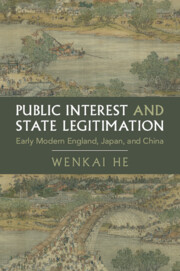Book contents
- Public Interest and State Legitimation
- Cambridge Studies in Historical Sociology
- Public Interest and State Legitimation
- Copyright page
- Dedication
- Contents
- Acknowledgments
- Introduction
- Part I Sources of Early Modern State Resilience
- 1 Legitimacy and Resilience of the Early Modern State
- 2 State–Society Collaboration against Subsistence Crisis
- 3 Financing Public Infrastructure
- 4 The Negotiation of State and Society over Redress of Grievances
- Part II The Emergence of Modern Politics
- Bibliography
- Index
4 - The Negotiation of State and Society over Redress of Grievances
from Part I - Sources of Early Modern State Resilience
Published online by Cambridge University Press: 17 November 2023
- Public Interest and State Legitimation
- Cambridge Studies in Historical Sociology
- Public Interest and State Legitimation
- Copyright page
- Dedication
- Contents
- Acknowledgments
- Introduction
- Part I Sources of Early Modern State Resilience
- 1 Legitimacy and Resilience of the Early Modern State
- 2 State–Society Collaboration against Subsistence Crisis
- 3 Financing Public Infrastructure
- 4 The Negotiation of State and Society over Redress of Grievances
- Part II The Emergence of Modern Politics
- Bibliography
- Index
Summary
The proclaimed duty of the state to safeguard the public interest provided a space for subordinates to engage with ruling authorities. It entailed the right of the ruled to remind the state to fulfill its obligation in the case of specific welfare grievances of its subjects. Such a right was passive, as it was derived from the state's duty to protect the public interest. The patterns of state response to popular claim-making were similar across Tudor and early Stuart England, Tokugawa Japan, and Qing China. The right to petition authorities was granted to individuals; yet the state did not allow crowd petitions, which were universally treated as disrespectful to authority and as a threat to social order. However, the state across these three cases was tolerant of collective petitions caused by cross-regional or cross-sectoral conflicts of interest, and it tried to arbitrate disputes as an impartial guardian of the public interest. The increasing scale of conflicts of interest that arose with population growth and commercialization led to larger-scale and well-organized popular petitions that were still accepted by the state. Such petitioning represented a political space that had great potential to expand with socioeconomic development.
Keywords
- Type
- Chapter
- Information
- Public Interest and State LegitimationEarly Modern England, Japan, and China, pp. 145 - 182Publisher: Cambridge University PressPrint publication year: 2023

